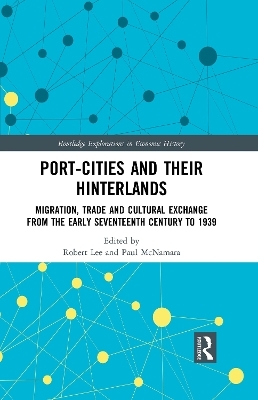
Port-Cities and their Hinterlands
Routledge (Verlag)
978-0-415-58052-6 (ISBN)
- Titel ist leider vergriffen;
keine Neuauflage - Artikel merken
This interdisciplinary book brings together eleven original contributions by scholars in the United Kingdom, continental Europe, America and Japan which represent innovative and important research on the relationship between cities and their hinterlands. They discuss the factors which determined the changing nature of port-hinterland relations in particular, and highlight the ways in which port-cities have interacted and intersected with their different hinterlands as a result of both in- and out-migration, cultural exchange and the wider flow of goods, services and information.
Historically, maritime commerce was a powerful driving force behind urbanisation and by 1850 seaports accounted for a significant proportion of the world’s great cities. Ports acted as nodal points for the flow of population and the dissemination of goods and services, but their role as growth poles also affected the economic transformation of both their hinterlands and forelands. In fact, most ports, irrespective of their size, had a series of overlapping hinterlands whose shifting importance reflected changes in trading relations (political frameworks), migration patterns, family networks and cultural exchange. Urban historians have been criticised for being concerned primarily with self-contained processes which operate within the boundaries of individual towns and cities and as a result, the key relationships between cities and their hinterlands have often been neglected. The chapters in this work focus primarily on the determinants of port-hinterland linkages and analyse these as distinct, but interrelated, fields of interaction.
Marking a significant contribution to the literature in this field, Port-Cities and their Hinterlands provides essential reading for students and scholars of the history of economics.
Robert Lee was the Chaddock Professor of Economic and Social History at the University of Liverpool, UK, where he is now an Emeritus and Honorary Professor. Paul McNamara is Assistant Professor in History and Political Science at the Technical University of Koszalin, Poland.
1 Port-towns, their hinterlands and forelands: a critical review 2 Rabat after the Morisco migration: a Maghrebi port city’s footprints, 1609-1666 3 An imposed co-operation: Porto and its hinterland between the Middle Ages and the Early Modern Period 4 Iberian trade monopolies and their impact on non-metropole ports and their hinterlands 5 Violence in eighteenth-century European port-cities and their hinterlands: Porto as a case study 6 Port cities and inland distribution: merchants’ functional divisions between early modern Amsterdam and its hinterlands 7 Circuits of migration to a port in the making: Antwerp, 1760-1860 8 The impact of the American foreland on the European transatlantic migrant trade via the port of New York 9 Ports as bridges between civilisations: the case of the Four Communes of Senegal, 1659-1914 10 Engineering in the port cities of British India: the notion of the intellectual hinterland 11 A Hinterland Rejected: The Free City of Danzig, Poland and the League of Nations, 1933-1939
| Erscheint lt. Verlag | 15.3.2022 |
|---|---|
| Reihe/Serie | Routledge Explorations in Economic History |
| Zusatzinfo | 14 Tables, black and white; 18 Line drawings, black and white; 34 Halftones, black and white; 52 Illustrations, black and white |
| Verlagsort | London |
| Sprache | englisch |
| Maße | 156 x 234 mm |
| Themenwelt | Geschichte ► Teilgebiete der Geschichte ► Wirtschaftsgeschichte |
| Sozialwissenschaften ► Soziologie | |
| ISBN-10 | 0-415-58052-8 / 0415580528 |
| ISBN-13 | 978-0-415-58052-6 / 9780415580526 |
| Zustand | Neuware |
| Haben Sie eine Frage zum Produkt? |
aus dem Bereich


